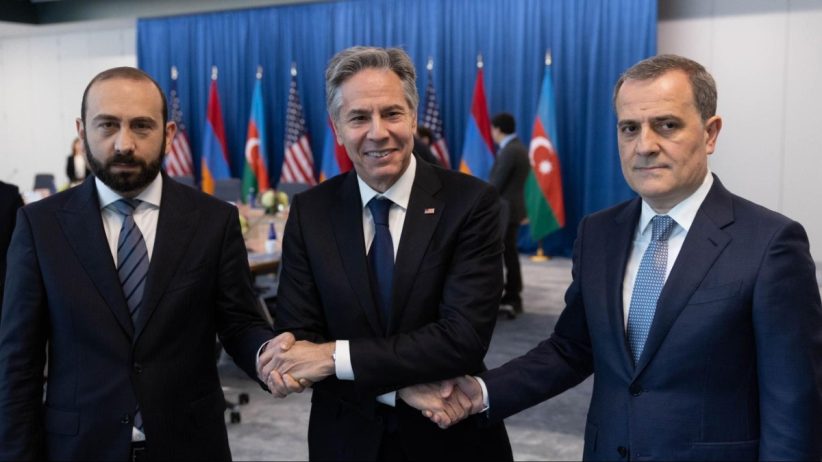By Mark Dovich
U.S. Secretary of State Antony Blinken launched multi-day negotiations in Washington Monday with Foreign Ministers Ararat Mirzoyan of Armenia and Jeyhun Bayramov of Azerbaijan, writing on his official Twitter account that “dialogue is key to reaching a lasting peace in the South Caucasus region.”
Readouts of the talks so far from Armenia’s Foreign Ministry have been light on detail, noting only that the agenda includes “issues related to regional stability and security and the process of normalization of relations between Armenia and Azerbaijan” and “the humanitarian situation resulting from the illegal blockade of the Lachin corridor.”
Amerikayi Dzayn, Voice of America’s Armenian service, reported that negotiations on a document titled “agreement on the normalization of relations” are set to run through Thursday, citing unnamed senior State Department officials.
Asked by reporters in Washington for more details about the talks, Vedant Patel, a State Department spokesperson, said repeatedly Monday he did not want to “get ahead of the process.”
The negotiations come days after Blinken made separate phone calls to Armenian Prime Minister Nikol Pashinyan and Azerbaijani President Ilham Aliyev to pledge “continued U.S. support” and share “his belief that peace (is) possible,” according to State Department readouts.
The talks also come amid escalating tensions in the region, with Azerbaijani border guards setting up a checkpoint last week on the only overland route connecting Nagorno-Karabakh and Armenia. Stepanakert and Yerevan have condemned the move as a violation of the Russia-brokered ceasefire that ended the 2020 war in and around Nagorno-Karabakh.
Days after, the self-styled Azerbaijani environmental activists who had set up a roadblock on a different section of the road last December announced they would “temporarily suspend” their activities, citing the new checkpoint.
Mirzoyan said last week that Yerevan “has never been and is not going to be involved” in negotiations with Baku over recent developments in the Lachin corridor, noting that the route’s status is already stipulated in the ceasefire.
In February, the International Court of Justice ordered Azerbaijan to “take all measures at its disposal to ensure unimpeded movement of persons, vehicles and cargo along the Lachin Corridor in both directions.” The ruling is legally binding, but the court has no enforcement powers.
Washington too has called on Baku to reopen the corridor, whose monthslong closure has prompted severe shortages of energy, food, and medicine in Nagorno-Karabakh.
Since the end of the 2020 war, the European Union, Russia, and the United States have emerged as the main mediators between Armenia and Azerbaijan, in effect displacing the Minsk Group, whose work has been largely frozen since Russia’s full-scale invasion of Ukraine last year.
Mirzoyan told reporters in Yerevan last week that Armenia does not “differentiate between the platforms…(of) Moscow, Washington, or Brussels,” adding that “there is one peace process…and the negotiations are essentially one and the same.”
Blinken last met with Pashinyan and Aliyev on the sidelines of this year’s Munich Security Conference in February.
















